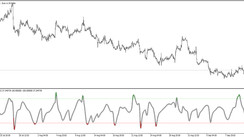Embracing the Dream of Financial Independence
Who hasn't fantasized about breaking free from the grind of a nine-to-five job? Imagine not having to wake up with the sunrise, rush through morning routines, and grudgingly join the throng of weary commuters. All of us have, at some point, yearned for this freedom.
The thought of living without a day job is indeed enticing. Let's journey together through the past and examine how this dream may take a shape.
First Encounters with Trading, Do You Remember?
One day, you just stumbled upon trading videos on YouTube, making it seem like the ticket to easy riches. All you needed, it seemed, was a grasp of supply and demand dynamics, an understanding of trendlines, and the patience to wait for a breakout. It sounded straightforward: take a position based on signals, and voilà, wealth would follow.
Armed with this newfound knowledge and a $500 account, you dived into the bustling world of forex trading, handling 10 lots like a seasoned trader. Luck maybe favored you initially, and your account balance swiftly doubled. Feeling as on top of the world, confident of quitting your day job in no time. However, reality struck back soon enough. A few losses later, and your account was wiped out.
Navigating the Rough Seas of Trading
Over the following months, you probably made a concerted effort to study trading seriously, consuming content voraciously, only to suffer repeated account blowouts. You explored various platforms, tested numerous strategies, and even might avail yourself of expert advice, all to no avail.
The Crucial Ingredient for Success
Eventually, some traders developed a strategy that yielded an average return with a nice percent win rate. You could have been tempted to borrow money to boost your trading capital or even jump into trading full-time. Backtesting showed a promising average monthly return, tempting you with visions of vast compounded profits. Hopefully, something held you back.
Every trader soon realized that he had overlooked the possibility of a losing streak or a period of drawdown which could severely impact the whole trading psychology. Despite the lure of an appealing monthly return, he had to acknowledge the risks and challenges that accompanied trading full-time.
The Real Backbone of Trading
You might wonder, if a trading strategy only forms 30% of a successful trading career, where does the remaining 70% come from? The answer lies in trading psychology.
Trading psychology is a critical yet often overlooked component of successful trading. Losing a trade, let alone a series of them, can induce feelings of sadness, anger, and demotivation. The emotional toll of these losses often leads traders astray from their plan, causing them to risk more, hoping the next trade will cover previous losses. This is a surefire recipe for disaster.
Without solid trading psychology, surviving as a full-time trader is virtually impossible.
Contemplating Full-Time Trading
As a full-time trader, you lose the security of a stable income. Suppose your monthly expenses total $2,000, and you have a steady income of $5,000 from your day job. In this scenario, your finances are secure. Your bills are paid, your pantry is stocked, and you even have money left for leisure and investments.
However, trading full-time introduces financial uncertainty. You need a profitable strategy, robust trading psychology, and substantial
Path to Trading Freedom
However, choosing to trade full-time is like being at the helm of a ship in unpredictable seas. First, you must ensure your strategy is solid and yields consistent profits. Second, your trading mindset needs to be steel-strong to withstand the constant ebb and flow of the market. Finally, you need to have a large enough capital to allow for regular withdrawals, while simultaneously growing your trading account.
If you're about to resign and plunge headfirst into full-time trading, please pause and deeply consider what I've just shared. Have you been trading live for at least a few years? Can your trading strategy withstand a variety of market conditions? The longevity of your strategy is crucial - a year's worth of successful trading could be a good starting point.
A Stable Financial Footing
In addition to your trading tactics, it's essential to get your personal finances in order. Remember, the switch to live trading means giving up a steady monthly income to rely solely on inconsistent trading earnings. This could lead to increased pressure during a drawdown period.
Imagine bills piling up, mouths to feed, debts to settle - without any income for months, the stress begins to mount. This inevitably impacts your trading mindset, leading to overtrading or even trades that deviate from your plan.
Ensure you have at least a year's worth of living expenses saved up. The more, the better. This cushion will cover your basic needs and any unexpected expenses, like medical emergencies. It also relieves the pressure to make "profitable" trades, particularly during a drawdown.
Proceed with Caution
The allure of trading full-time and escaping the 9-5 grind is strong. But a cautious approach is recommended. Many traders balance their regular job with trading, focusing on higher timeframes instead of volatile, shorter ones. This strategy offers a consistent monthly income while allowing their trading account to grow.
By taking on funded account challenges and consistently receiving payouts, they are building a safety net before transitioning into full-time trading. Although it may take a few more years, the peace of mind over stress is worth it.
Own Your Trading Journey
Accountability is crucial in trading, but how many truly hold themselves accountable? How often have you strayed from your trading rules? It's challenging to remain disciplined when you're alone in this journey. That's why having a mentor or an accountability partner can make a world of difference.
Conclusion? Persistence Pays Off...
The path to successful trading is often riddled with challenges. It requires a combination of sound strategy, strong mindset, and disciplined personal finance. Whether you're trading alongside a day job or considering taking the plunge into full-time trading, it's essential to tread carefully and ensure you have a sturdy safety net. Stay patient and remember that success could be just around the corner.





